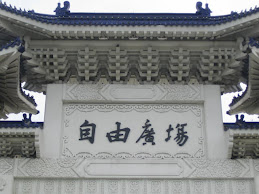TAIPEI, Taiwan--With the Beijing Olympics about a week away, there has been controversy over the use of “Chinese Taipei” or “Chinese Taipei”. Huh?
Rather, the fuss has been about “Chunghua Taipei”, which has been Taiwan’s official name at the Olympics and elsewhere, and “Chungguo Taipei”, which is the term being used by the Chinese media. Some think that the latter is more equivalent to Taipei, China. To me, both terms are translated the same way and are equally pathetic.
So why did the KMT rejoice when the Chinese media finally used Chunghua Taipei, despite the fact that there have been agreements with China and the International Olympic Committee all along? Presidential Office Spokesman Wang Yu-chi (王郁琦) said that the Chinese government was extending its goodwill and won’t like it if Taiwan continues to complain, as if we should walk on eggshells to avoid antagonizing them. Is this why the KMT still hasn’t changed its official name as the Chinese Kuomingtang?
Had the Chinese media not agreed to the change, Sports Affairs Council Chairwoman Tai Hsia-ling (戴遐齡) and KMT Chairman Wu Poh-hsiung (吳伯雄) were going to propose a boycott of the Beijing Games. Legislator John Chiang (蔣孝嚴) also joined in, but it depends on when you ask him. Not too long ago, he had suggested that the Chinese and Taiwanese teams march together into Olympic Stadium, just as North and South Korea had done in Sydney 2000 and Athens 2004.
It’s obvious that the Olympics are a hotbed for political overtones. Protesting the Soviet invasion of Afghanistan, the US boycotted the 1980 Moscow Games. The Soviets came right back to boycott the 1984 Games in Los Angeles. Of course, the shadow of the Munich 1972 massacre of 11 Israeli athletes by Palestinian rebels still hangs over the spirit of the Olympic Games.
There are more subtle instances. In Barcelona 1992, the gold medalist from Estonia saw her nation’s flag flown for the first time, except that it was upside down. In Lillehammer 1994, Oksana Baiul beat Nancy Kerrigan for the ladies figure skating title but had to wait for organizers to find a copy of the Ukrainian national anthem. These were all results of the fall of the former Soviet Union, which sent athletes to Albertville in 1992 to compete as the Unified Team under the Olympic flag with the 5 rings. Its gold medalists listened to the Olympic Hymn.
However, not using your country’s name, not seeing your country’s flag and not hearing your national anthem are permanent realities for Taiwanese athletes. The two gold medalists from Athens 2004, Chen Shih-hsin (陳詩欣) and Chu mu-yen (朱木炎), saw the flag of the Chinese Taipei Olympic Committee as it was raised but saluted it anyway out of habit. During the Atlanta 1996 Games, a Taiwanese spectator was kicked out of the stands for waving the country’s flag.
Starting with the Opening Ceremonies, we will get to see how Beijing treats Taiwan. A group of indigenous performers, led by legislator May Chin (高金素梅), will participate. Given that the ceremonies are a showcase of a country’s culture to the world and that China has many minority groups, I question the appropriateness. Chin has come out to say that they are not Han Chinese and will only go by the name of Taiwanese indigenous people. Another indigenous star from Taiwan, the singer Chang hui-mei (張惠妹), had already been tapped to record one of the Olympic theme songs. In 2000, she was banned from appearing in China for singing the national anthem at President Chen Shui-bian’s (陳水扁) inauguration. Apparently, all has been forgiven.
Just today, it has been reported that Taiwan will be #24 out of 205 delegations in the Parade of Nations. I had been confident that there would be no controversy because the host nation always enters last by tradition. The order is determined by the host’s language system, but a special compromise has always allowed Chinese Taipei to enter with the T’s. This time, Beijing organizers have decided to use the “Chinese” part of Chinese Taipei. Thus, it goes…Japan, Chinese Taipei, Central African Republic, and Hong Kong…
This is a dirty trick by the Chinese government, yet Spokesman Wang claims that it is another goodwill gesture. In a send-off event today for the Olympic Team, President Ma Ying-jeou (馬英九) emphasized that all issues have been resolved. More eggshells, please!
 Wild Strawberry Movement, renamed Taiwan Democracy Memorial Hall, November 2008 (from Taipei Times)
Wild Strawberry Movement, renamed Taiwan Democracy Memorial Hall, November 2008 (from Taipei Times) (The following appears on a plaque next to the photograph.)
(The following appears on a plaque next to the photograph.)

 CHIAYI,Taiwan--Even though Ma hasn't officially taken office yet, there's already been several changes (or talk of changes). So keeping in mind Ma's platform of improving the economy, let's take a look at what's been reported so far (in chronological order):
CHIAYI,Taiwan--Even though Ma hasn't officially taken office yet, there's already been several changes (or talk of changes). So keeping in mind Ma's platform of improving the economy, let's take a look at what's been reported so far (in chronological order): i-Taiwan 12 projects
i-Taiwan 12 projects


